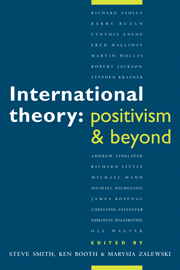1 - Positivism and beyond
Published online by Cambridge University Press: 09 March 2010
Summary
For the last forty years the academic discipline of International Relations has been dominated by positivism. Positivism has involved a commitment to a unified view of science, and the adoption of methodologies of the natural sciences to explain the social world. The so-called ‘great debates’ in the discipline's history, between idealism and realism, traditionalism and behaviouralism, or between transnationalism and state-centrism, have not involved questions of epistemology. The discipline has tended to accept implicitly a rather simple and, crucially, an uncontested set of positivist assumptions which have fundamentally stifled debate over both what the world is like and how we might explain it. This is not true of those who worked either in the so-called ‘English school’ or at the interface between international relations and political theory, because these writers never bought into the positivist assumptions that dominated the discipline. But it has been the dominance of positivism that has accounted for both the character, and more importantly, the content of the central debates in international theory.
Viewed in this light, even the inter-paradigm debate of the 1980s looks very narrow, because all three paradigms, (realism, pluralism and globalism/structuralism) were working under positivist assumptions. This helps explain just why they could be seen as three versions of one world, rather than three genuine alternative views of international relations. Similarly, the current ‘debate’ between neo-realism and neoliberalism becomes much clearer when it is realised that both approaches are firmly positivist.
Information
- Type
- Chapter
- Information
- International TheoryPositivism and Beyond, pp. 11 - 44Publisher: Cambridge University PressPrint publication year: 1996
Accessibility standard: Unknown
Why this information is here
This section outlines the accessibility features of this content - including support for screen readers, full keyboard navigation and high-contrast display options. This may not be relevant for you.Accessibility Information
- 83
- Cited by
